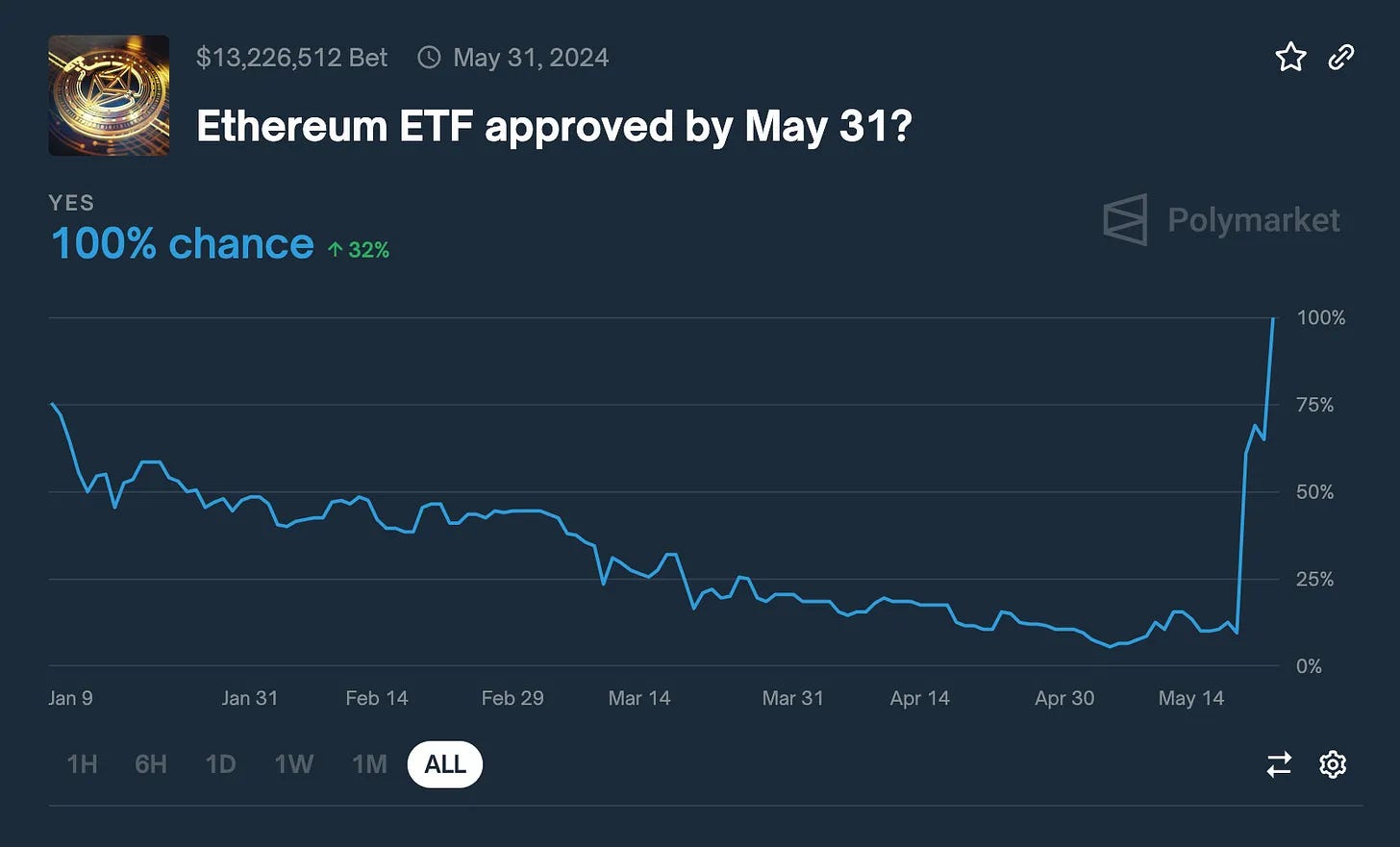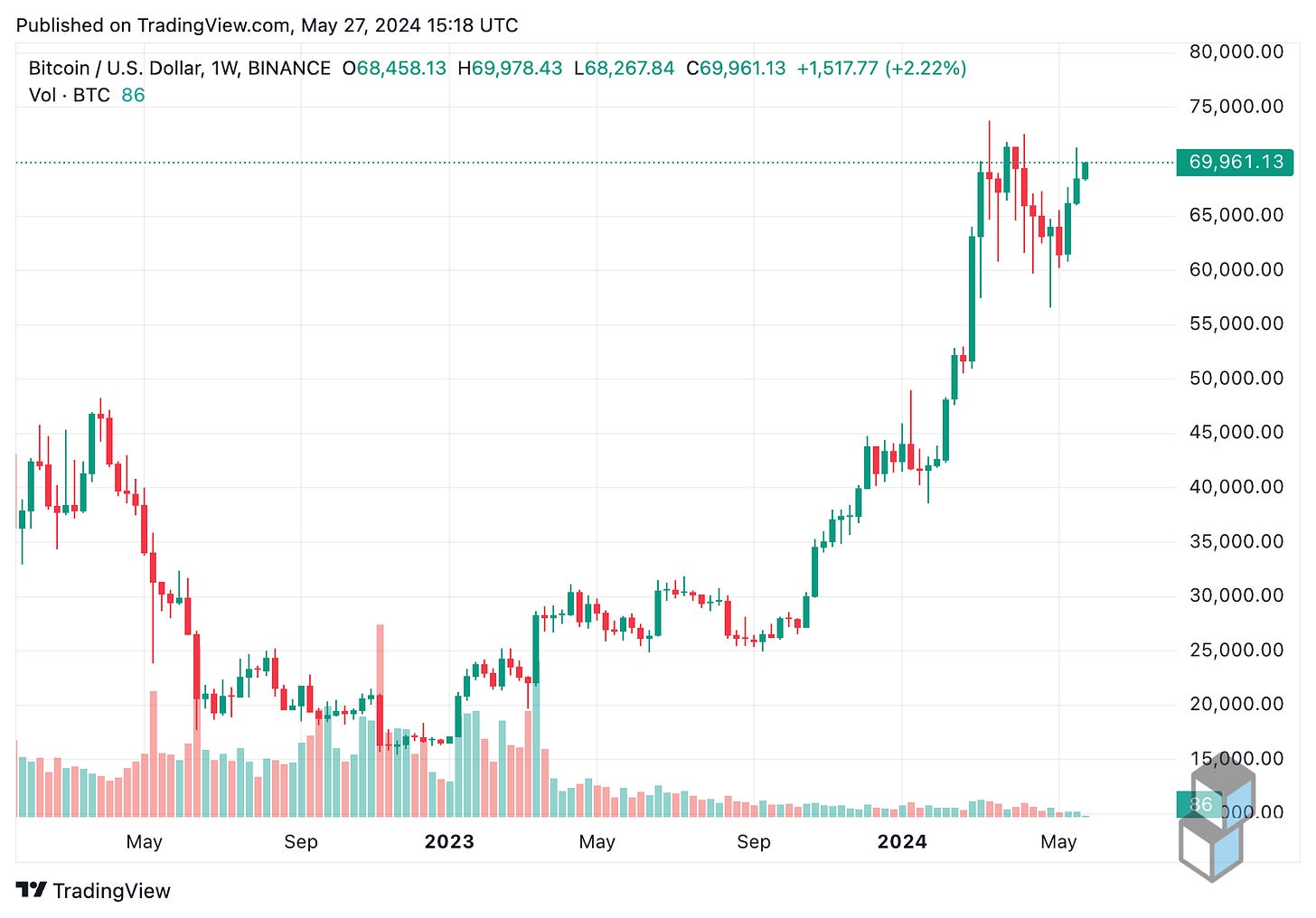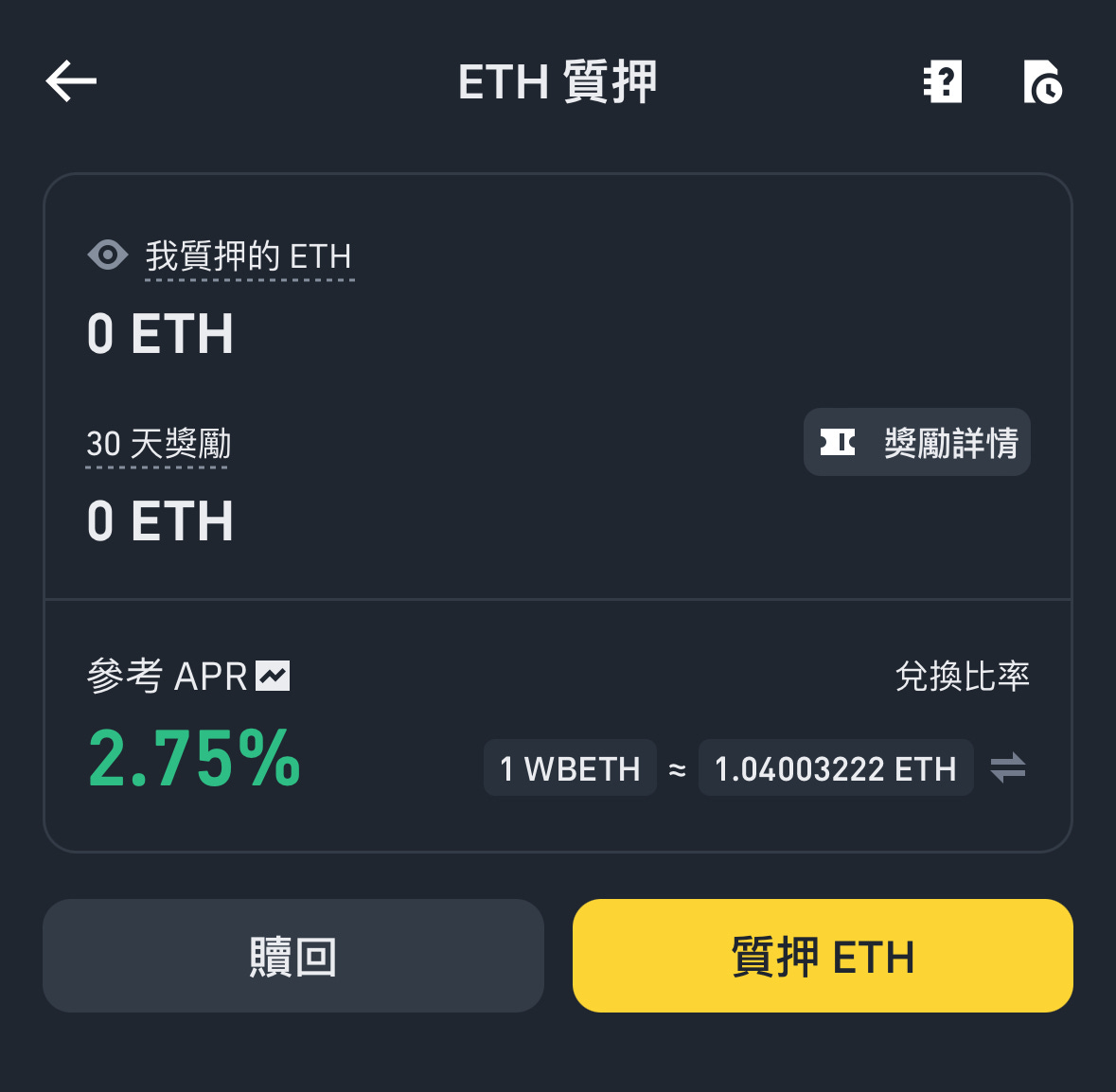GM,
If the Taiwanese government announced the approval of an Ethereum ETF today, making it available for purchase on the stock market, what would you choose if you wanted to buy Ethereum?
Share your reasons in the comment section.
Last week, the U.S. Securities and Exchange Commission (SEC) unexpectedly approved the listing and trading of a spot Ethereum ETF, shocking everyone. Prior to this, the on-chain prediction market Polymarket's "betting pool" estimated the probability of an Ethereum ETF being approved in the near future at only 10%. In just a few days, the probability shot up like an elevator. It has now reached an unprecedented 100%.
Even the price difference1 between the Grayscale Ethereum Trust (ETHE) and spot Ethereum quickly narrowed from an original 20% discount to just 1%. If you had foreseen this last week and bought the fund, you could have made a 19% profit.
The SEC’s decision was unexpected. But why was the market previously pessimistic about the approval of an Ethereum ETF, and what impact will this approval have? To understand this, we need to look back at the SEC’s enforcement actions over the past year.
SEC’s Major Enforcement Actions
SEC Chairman Gary Gensler is a knowledgeable opponent of cryptocurrencies. Previously a professor at MIT Sloan School of Management, Gary Gensler started teaching a course on Blockchain and Money in 2018, which has garnered 6.82 million views online.
People had high hopes for this blockchain expert, expecting him to be an enlightened SEC chairman who would bridge the gap between cryptocurrencies and traditional finance. However, in reality, things turned out differently. Under Gary Gensler’s leadership, the journey has been more circuitous.
The turning point came at the end of 2022. At that time, the FTX exchange collapsed, prompting calls for the government to strengthen cryptocurrency regulation. The SEC stepped in and launched a major enforcement campaign.
The first casualty was the American cryptocurrency exchange Kraken2. Founded in 2011, Kraken was a model in the exchange industry. Like other exchanges, it offered Ethereum staking services, allowing investors to "put their money to work" by earning staking rewards after purchasing Ethereum. Kraken was ranked third in the Ethereum staking market, just behind Lido and Coinbase, and ahead of Binance. However, this service caught the SEC’s attention.
The SEC accused Kraken of illegally offering Ethereum staking services and warned that holding user funds could lead to another FTX-like incident3. Kraken, while not admitting to any wrongdoing, chose to settle with the SEC, paying a $30 million fine and ceasing its cryptocurrency staking services. The SEC hailed this as a victory for investors:
Whether through staking, lending, or other means, any intermediary offering investment contracts in exchange for investors' tokens must comply with securities laws, ensuring proper information disclosure and user protection measures. Today's enforcement action sends a clear message to the market that staking service providers must register with the SEC.
Shortly after, the SEC sued4 another American cryptocurrency exchange, Coinbase, accusing it of "misleading" by operating as a cryptocurrency exchange while engaging in securities trading. The SEC’s lawsuit against Coinbase was based on the same rationale — it offered Ethereum staking services without registering with the authorities, clearly violating the law. Unlike Kraken, Coinbase, being a publicly traded company, was not easily intimidated. They opted to fight the SEC in court rather than settle.
The lawsuit is still ongoing, with no resolution yet. But the SEC, seemingly addicted to litigation, continued to expand its enforcement actions. Last month, the SEC sent Wells Notices to three companies providing services based on Ethereum — Uniswap, Robinhood, and Consensys — accusing them of offering trading, staking, or brokerage services for Ethereum in different forms. In just over a year, the SEC has opened five fronts, all targeting Ethereum as an illegal security.
Except for Kraken, which willingly paid the fine, the other four companies plan to confront the SEC head-on. This sets the stage for an impending legal battle, where both sides will fiercely argue in court, leaving it to the judiciary to determine whether Ethereum is a security. Just as everyone was holding their breath, the SEC suddenly announced a major news — the approval of an Ethereum ETF for trading — to which everyone’s first reaction was: "What???"
Partially Approved
Currently, the Ethereum ETF is not fully approved, so investors wanting to buy an Ethereum ETF will have to wait a bit longer. According to Bloomberg:
On Thursday, the SEC opened the door for people to invest in Ethereum ETFs, pushing the digital asset industry to a new milestone. The SEC approved the listing of the world’s second-largest cryptocurrency-related product on the Nasdaq, the New York Stock Exchange, and the Chicago Board Options Exchange. Before last week, the likelihood of this was very low. However, it has overcome a critical barrier. As soon as Ethereum ETF issuers receive regulatory approval, trading can begin. There is no clear timeline yet.
Although the SEC has not yet approved the issuance of a spot Ethereum ETF, it has permitted exchanges to list it. The SEC would not allow stores to open without anything to buy or sell, so this essentially announces that the Ethereum ETF application is about to be approved. This will make it the second spot cryptocurrency ETF in the U.S., following the Bitcoin ETF. This is good news for investors, who will be able to indirectly hold Ethereum through an Ethereum ETF without worrying about private keys, phishing5, or exchange risks.
However, this decision has shocked everyone because it makes the SEC appear "schizophrenic."
An ETF is a security. If the SEC had already deemed Ethereum a security, there would be no need for an Ethereum ETF. The SEC could use this as a reason to reject the Ethereum ETF application. Yet, the SEC has taken Ethereum-related companies to court for "violating securities laws" while simultaneously approving the listing of an Ethereum ETF. This leaves everyone confused about the SEC’s stance.
Later, Gary Gensler was asked about this in public and reiterated his opposition to cryptocurrency ETFs before explaining the specific reason: "Cryptocurrencies have many fraud cases, such as FTX. Some leaders in this field are either already in prison, awaiting imprisonment, or awaiting extradition. Ultimately, this is due to widespread non-compliance with U.S. laws... But the courts have adopted a different view from ours, and we have taken this into consideration and made adjustments."
His tone conveyed his frustration. Gary Gensler dislikes cryptocurrencies and wants to block all cryptocurrency ETFs. Unfortunately, the SEC lost in court last year and lacked a solid legal foundation, so it had to reluctantly approve the listing of Bitcoin ETFs earlier this year. Consequently, the price of Bitcoin surged to new historical highs.
Currently, facing the application for the Ethereum ETF, the SEC could not find other reasons to reject it, reluctantly allowing it to proceed. However, this approval marks the beginning of confusion, as everyone is waiting to see how the SEC will handle the apparent policy contradictions.
Policy Contradictions
Of course, the SEC might continue its "schizophrenic" approach, asserting in court that Ethereum is an illegal security. This could be Gary Gensler’s last chance to overturn the situation. The key lies in how the court defines Ethereum’s staking mechanism—Is staking Ethereum an investment scheme?
The image below shows Binance's Ethereum staking interface, indicating that staking Ethereum can yield an annual return of 2.75%. There is an investment and a promised return—the more you invest, the higher the return. The SEC would argue: "If this isn't a security, then what is?"
From a technical perspective, staking is a form of digital labor. I like to compare it to miners digging for gold in the past. Miners exert physical effort to obtain gold, a process known as mining. Nowadays, people use computing power to obtain digital gold (Bitcoin), which is also called (digital) mining. Both processes are fundamentally the same; they are not like investments where one can "gain without effort" by relying solely on others' efforts.
The staking mechanism of Ethereum might seem like just depositing money. However, this money is actually contributing to building a global economic moat6 with others online to prevent hacker attacks. Hackers would need to hold a substantial amount of Ethereum to alter transaction records on the Ethereum blockchain. Just thinking about where to buy or steal such a large amount of Ethereum would make hackers reconsider, deeming the attack not worthwhile and abandoning the idea.
Whether Ethereum staking is considered an investment or labor depends on the judge’s understanding of the technical nature. Alternatively, the SEC might simply admit its mistake and withdraw the lawsuit.
Many people suggest that the SEC’s 180-degree reversal in attitude has political considerations, with votes being an influencing factor. Ultimately, as a financial and blockchain expert, Gary Gensler should see the challenging issues of cryptocurrencies as a prime opportunity to use his expertise to act as a bridge for communication. Instead, he chose to abandon his expertise and shut down communication, leaving the judges to do his job, which might be the fundamental reason for the policy contradiction.
Blocktrend is an independent media platform sustained by reader subscription fees. If you find Blocktrend's articles valuable, we welcome you to share this piece. You can also join discussions on our member-created Discord or collect the Writing NFT to include this article in your Web3 records.
Furthermore, please consider recommending Blocktrend to your friends and family. If you successfully refer a friend who subscribes, you'll receive a complimentary one-month extension of your membership. You can find past issues in the article list. As readers often inquire about referral codes, I have compiled them on a dedicated page for your convenience. Feel free to make use of them.






